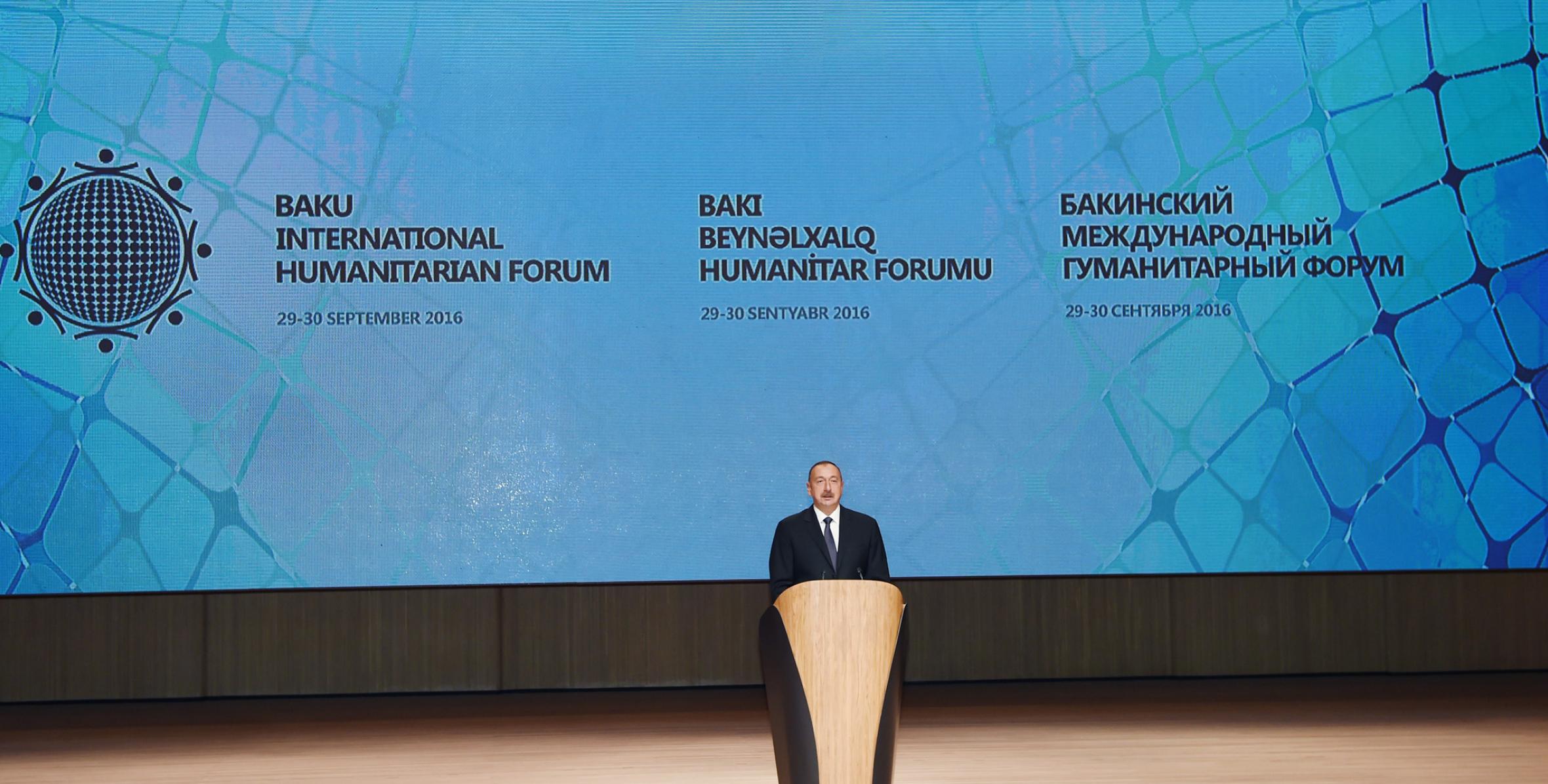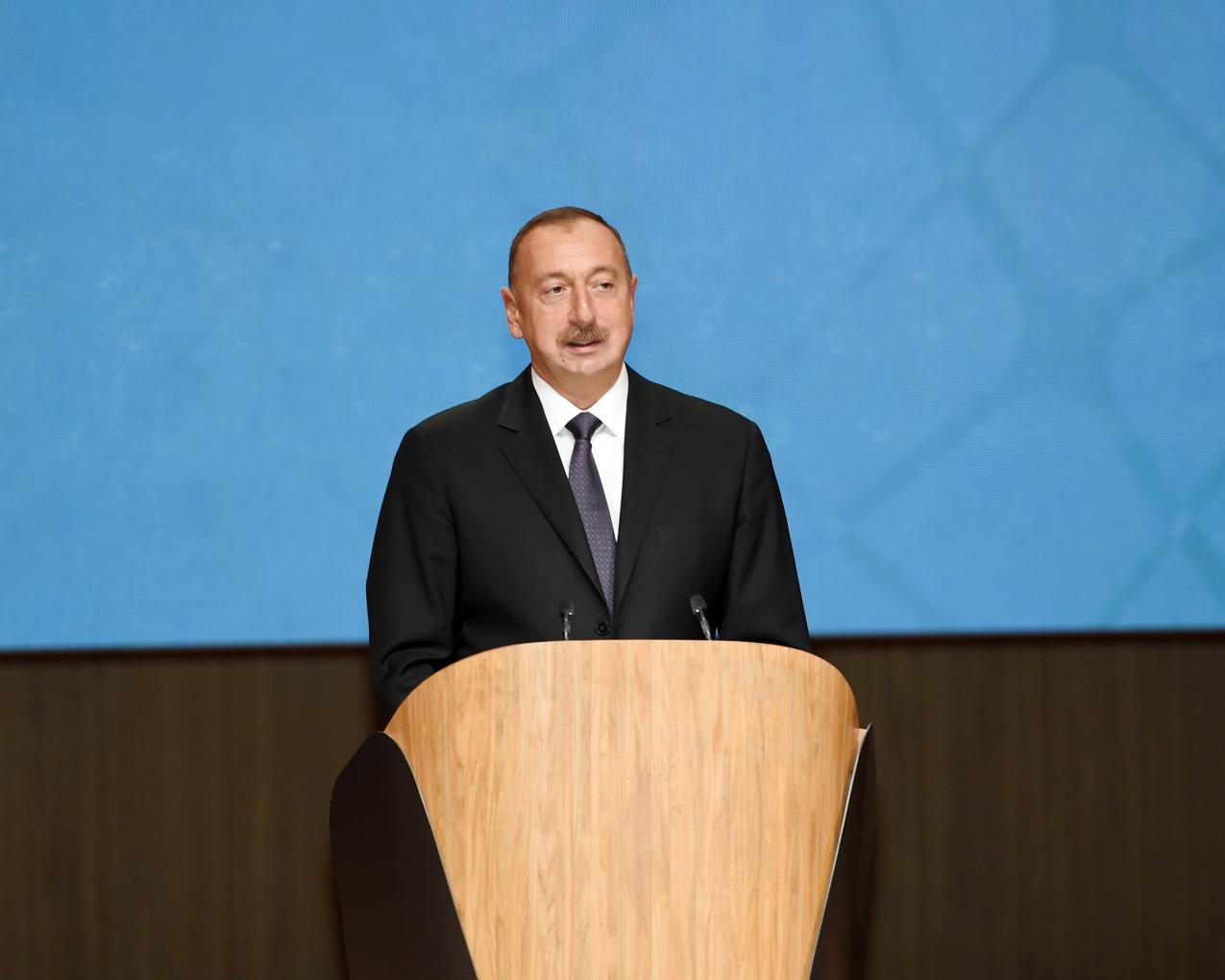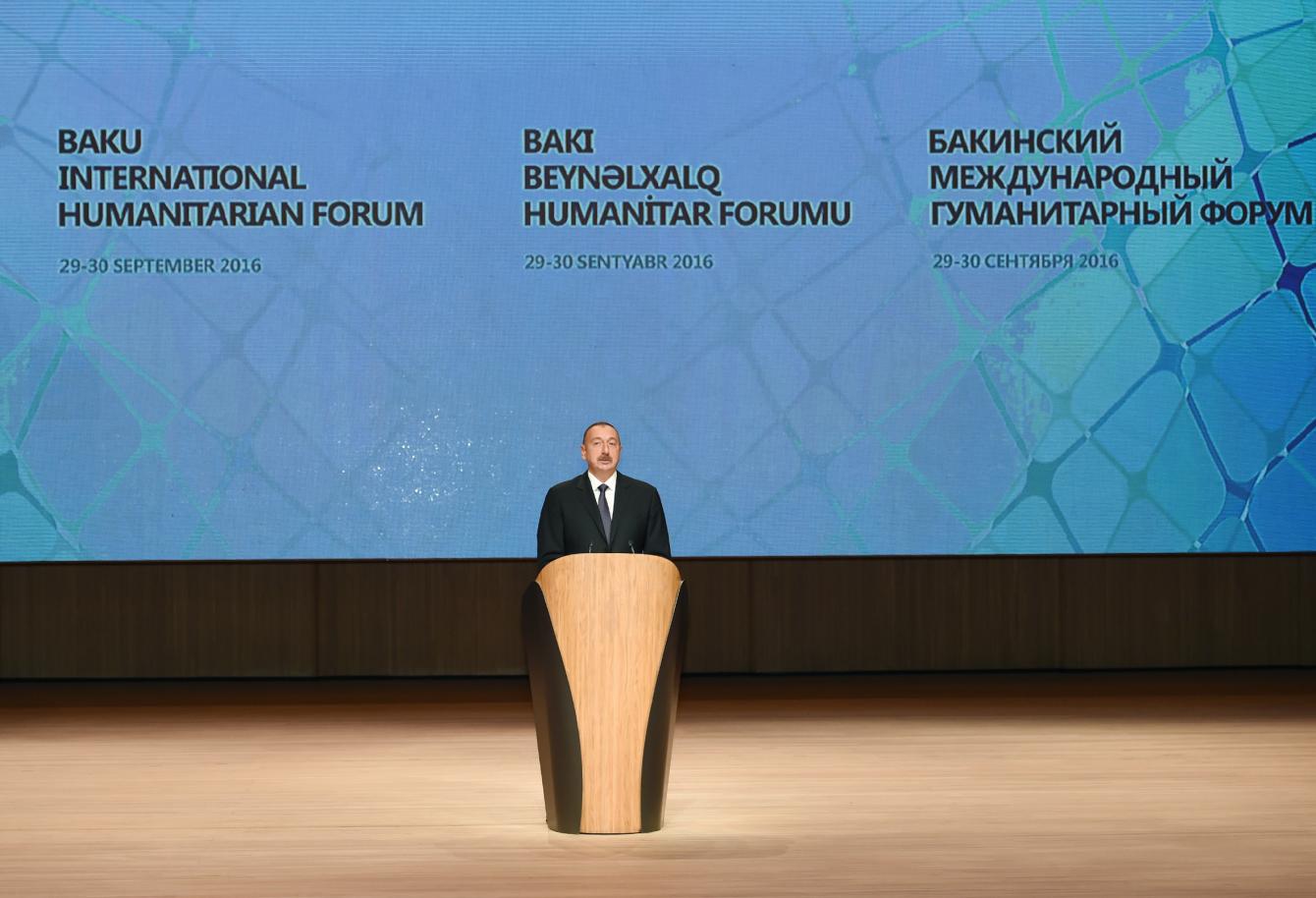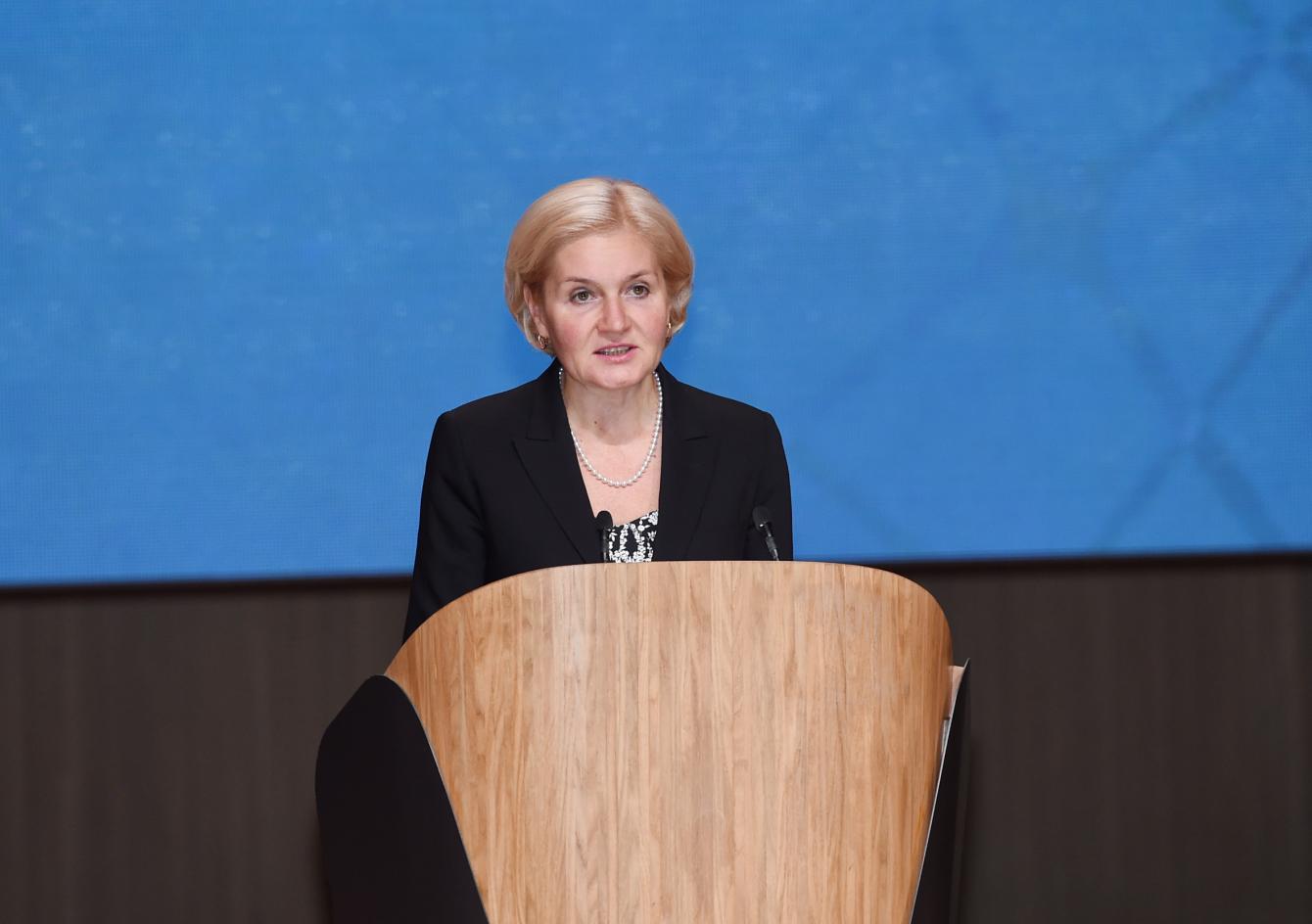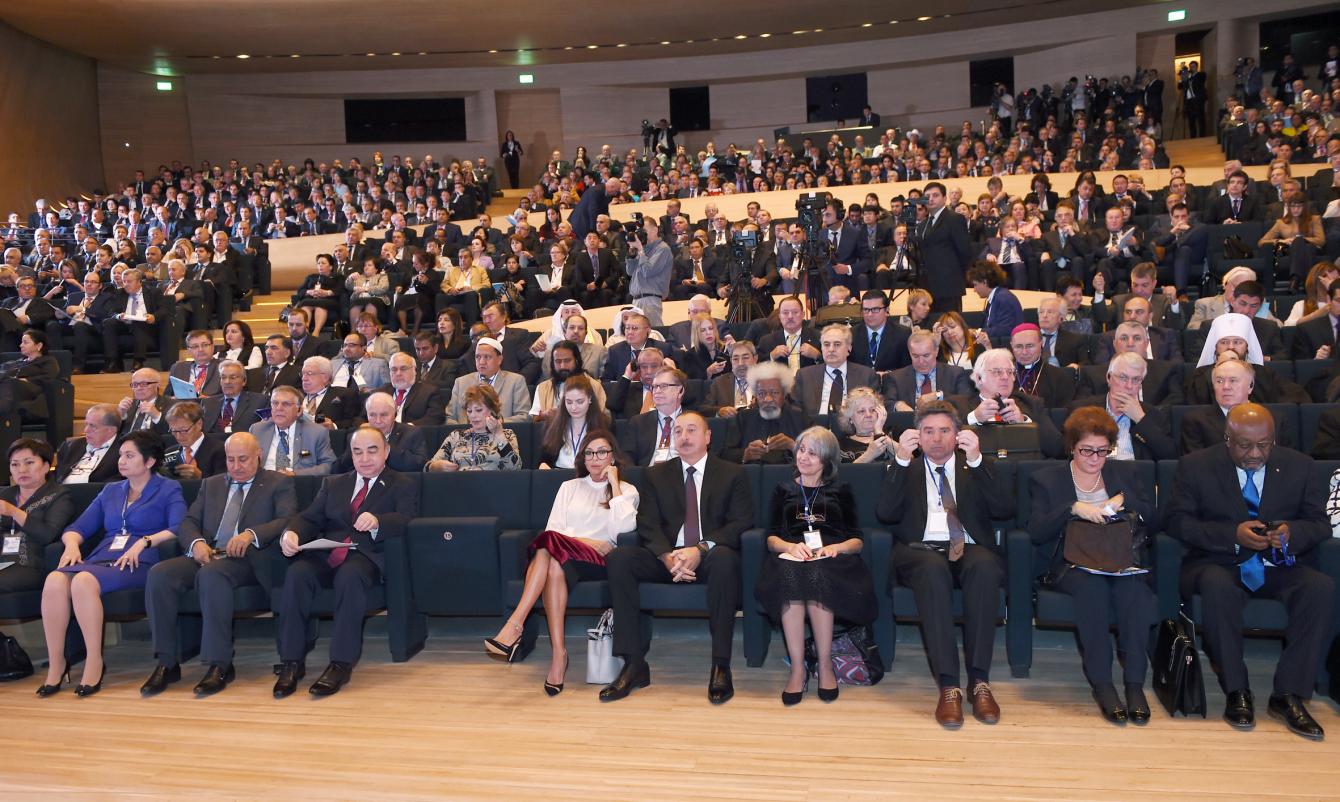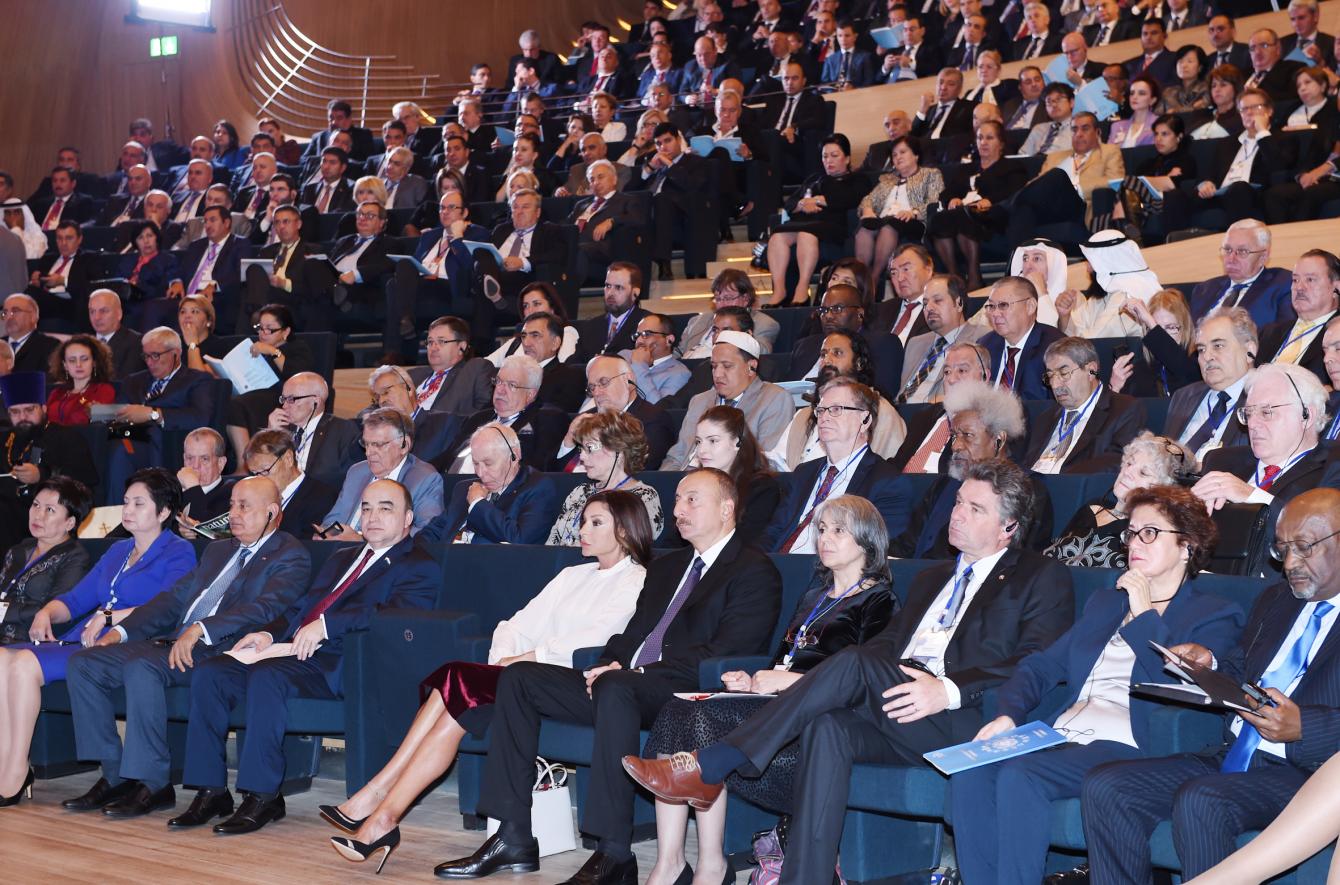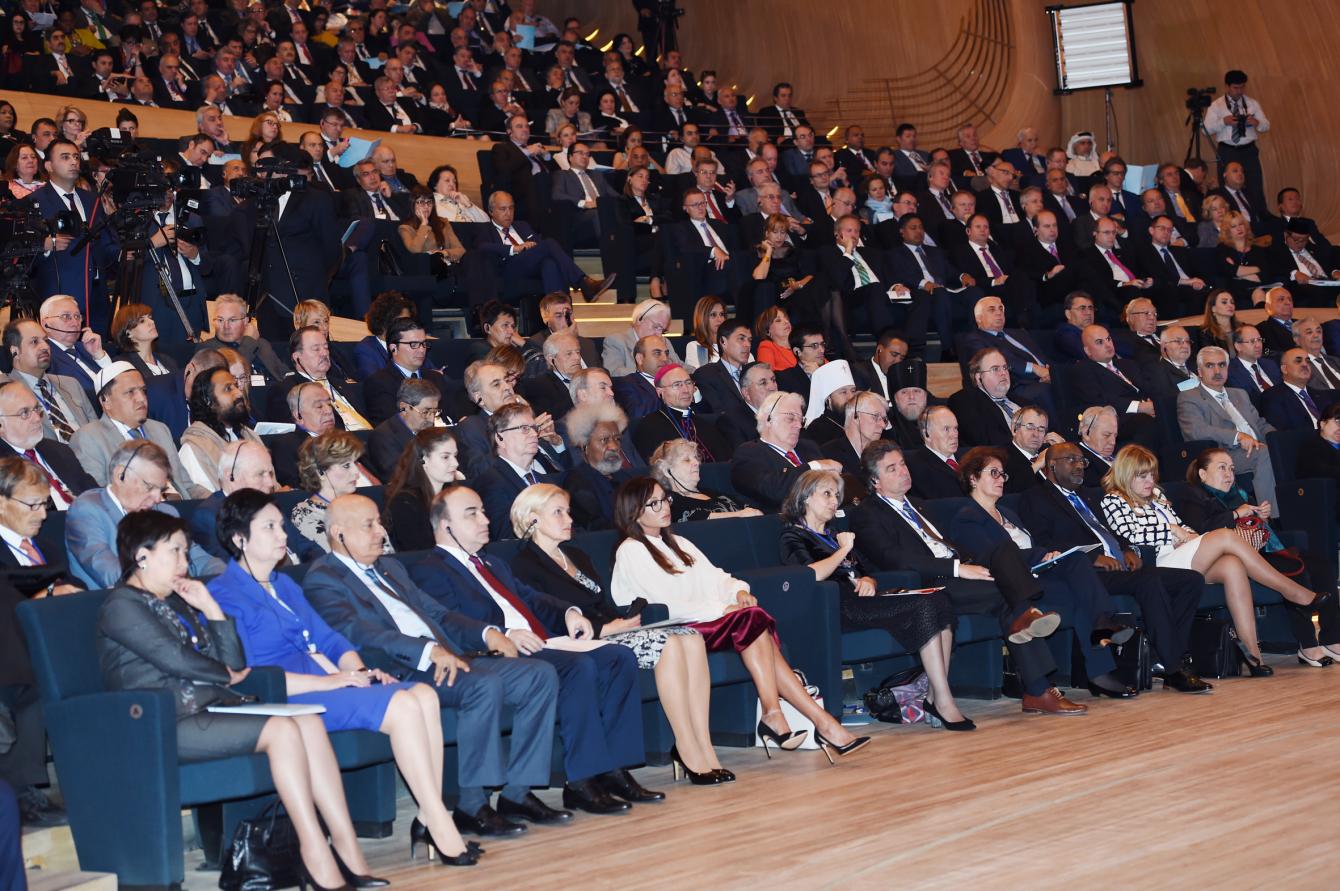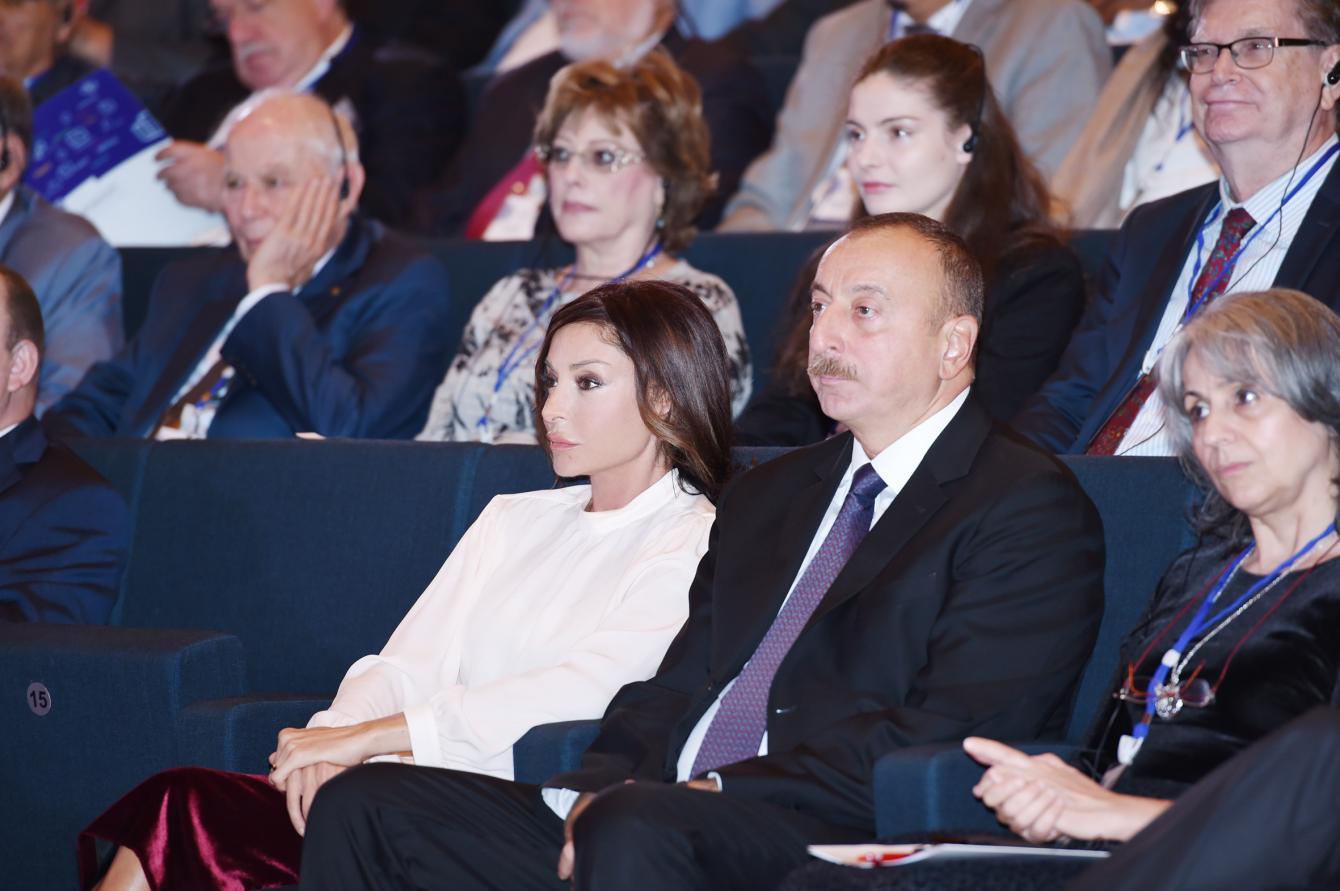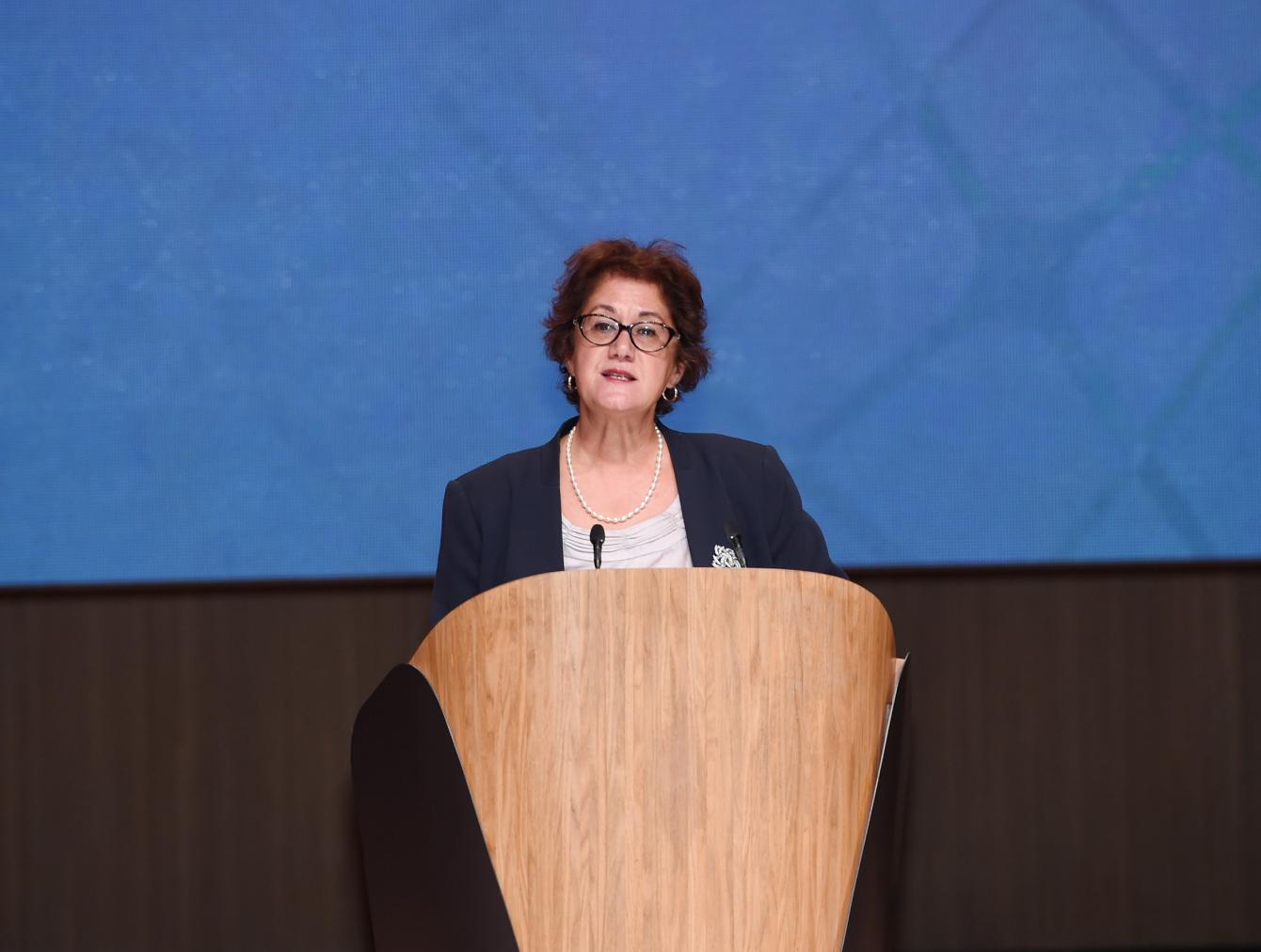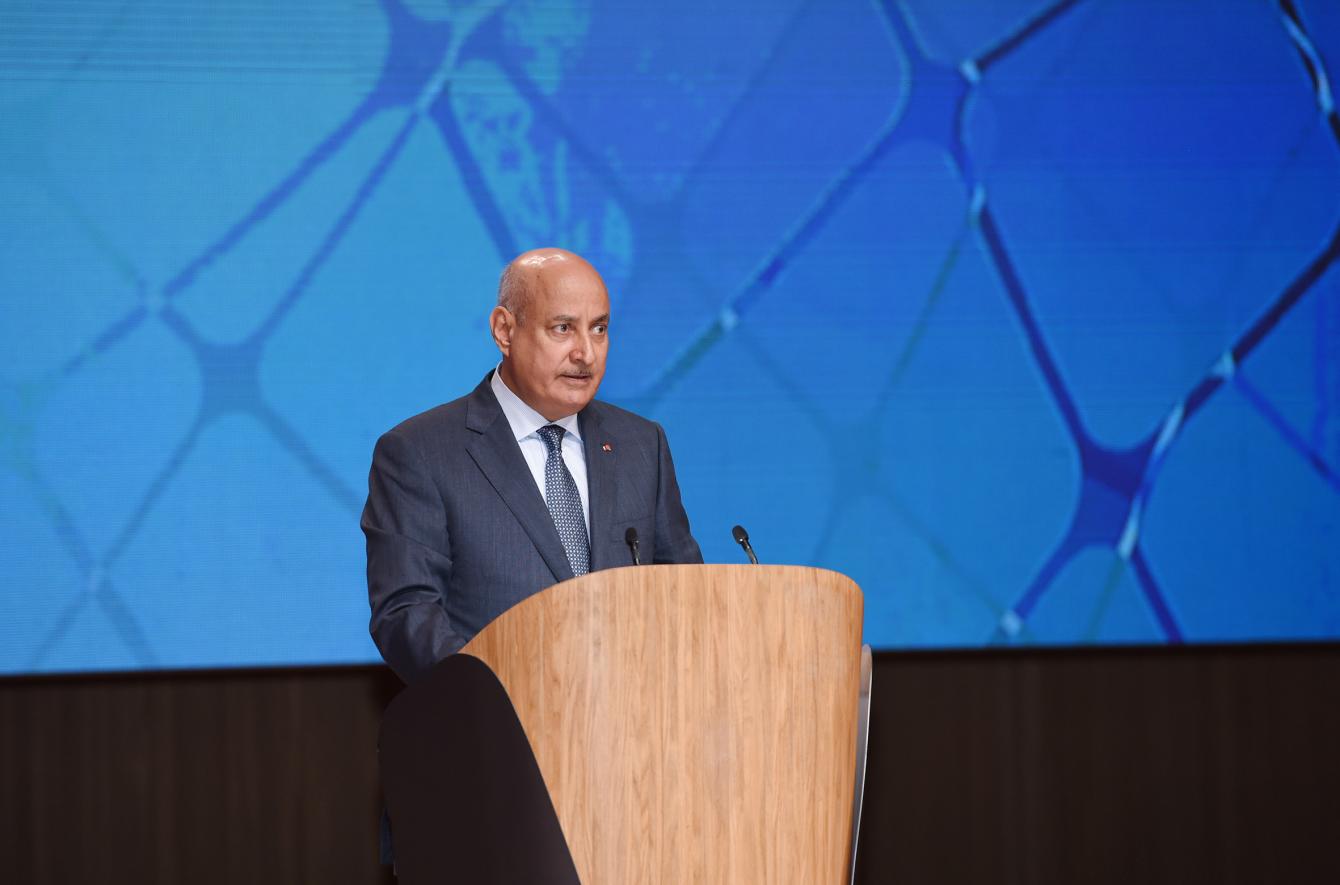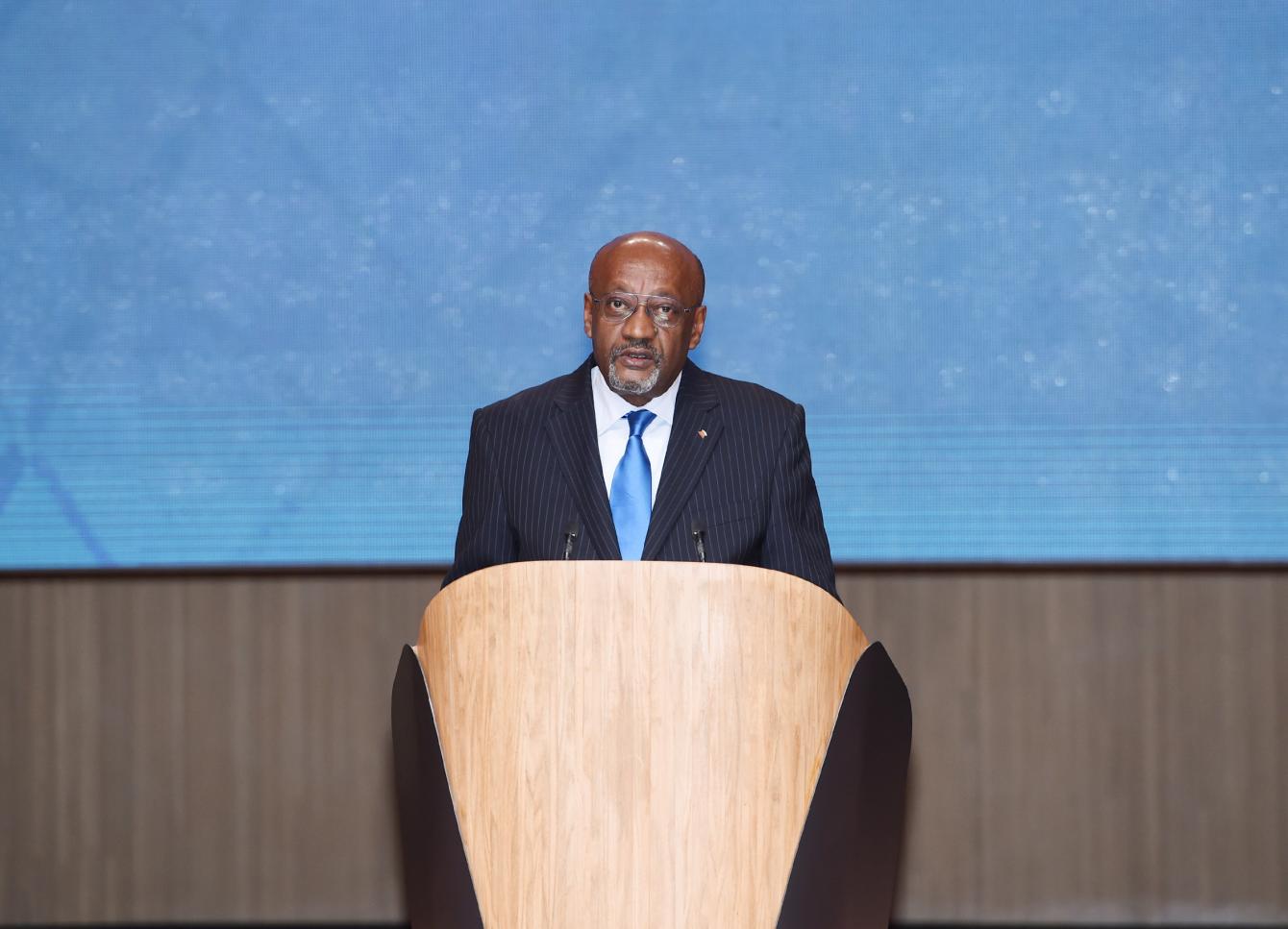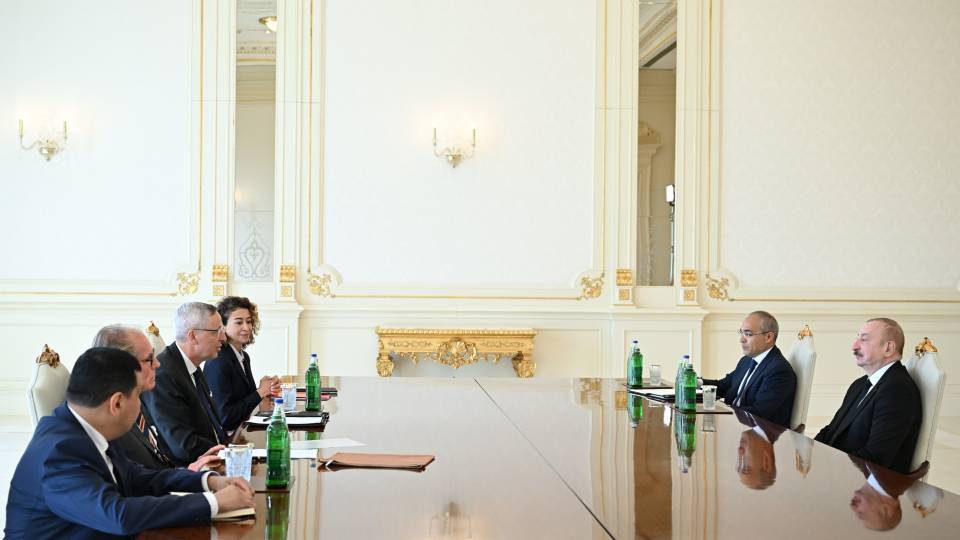The 5th Baku International Humanitarian Forum has today started at the Heydar Aliyev Centre.
President of the Republic of Azerbaijan Ilham Aliyev and his spouse Mehriban Aliyeva attended an official opening ceremony of the Forum.
Baku International Humanitarian Forum is an annual platform for famous representatives of political, scientific and cultural elite of the world community including famous statesmen, Nobel Prize winners in various fields of science and leaders of influential international organizations for holding dialogues, discussions and exchange of views on a wide range of global issues in the interest of all humanity.
The organizers and participants of the Forum are representatives of natural and social sciences, as well as cultural elite of the world who have an ambitious task of forming a new humanitarian agenda with the aim of its further consideration in the world scale.
The head of state addressed the opening ceremony of the Forum.
Speech of President Ilham Aliyev
- Dear ladies and gentlemen!
Distinguished guests!
The Baku International Humanitarian Forum is beginning its work. Let me cordially greet all the guests who have come to our country to participate in this forum, and say "Welcome to Azerbaijan"!
The current forum brings together over 400 representatives from almost 80 countries. This is an indicator in itself. In recent years, the forum has gained a lot of respect in the international arena. It holds a special place among the most prestigious international events. Azerbaijan has always paid great attention to international humanitarian cooperation. We believe that positive trends in the world should be enhanced. International cooperation plays a special role in the development of relations among countries. In recent years, we have hosted numerous international events with this purpose. A special place among them, of course, is occupied by the Baku International Humanitarian Forum. Our country hosts the Forum on Intercultural Dialogue every other year. The summit of world religious leaders was held in Baku several years ago. This year we held the Seventh Global Forum of the UN Alliance of Civilizations. As part of all these prestigious events, extensive discussions were held on international humanitarian cooperation, multiculturalism and other important issues.
In recent years, Azerbaijan has also played host to prestigious sporting events. This year alone, Baku hosted the Formula 1 competition and the World Chess Olympiad for the first time. The inaugural European Games were also held in Baku last year. This is an indicator because the first European Games were held in a Muslim country, which can be viewed as Azerbaijan's contribution to the strengthening of interreligious and intercultural dialogue. Next year, the Sixth Islamic Solidarity Games will be held in Baku as well. In other words, one city hosts European and Islamic Games over the course of two years. This is the path of the present-day Azerbaijan.
There are many goals we have pursued when hosting these international events in our country. First of all, it is necessary for our country because Azerbaijan is a multi-religious and multi-ethnic country. Representatives of all religions and nationalities live in Azerbaijan like one family. At the same time, these international political and humanitarian events send a message to the world that progressive representatives of the world should consolidate their efforts even more closely. Unfortunately, negative trends prevail in the world today. There are bloody clashes and wars in various regions of the world. There is bloodshed on religious and ethnic grounds. The deepening of international humanitarian cooperation can prevent the negative and enhance positive trends to some extent.
Azerbaijan is a member of the Council of Europe and the Organization of Islamic Cooperation, and plays an active role in both organizations. On Azerbaijan’s initiative, both organizations have adopted very fair resolutions based on international law regarding the most painful issue for us – the Armenia-Azerbaijan Nagorno-Karabakh conflict. The resolutions describe Armenia as an occupier state. We continue to work successfully in these two organizations, which bring together more than 100 countries worldwide. A few years ago we thought that it would be nice if there was a contact between the Council of Europe and the Organization of Islamic Cooperation. With this aim, we invited the Ministers of Culture of the Organization of Islamic Cooperation to the Baku forum of the Ministers of Culture of Council of Europe member-states in 2008. This resonated very well in the world. Our work in this area received good feedback and the initiative was called the "Baku process". In 2009, we received the Ministers of Culture of the Organization of Islamic Cooperation and invited the Ministers of Culture from Europe to that meeting. Thus, a very important new process was launched on our initiative. Of course, we are very proud that this initiative was subsequently called the "Baku process".
We are trying and will continue trying to contribute to the strengthening of interreligious and intercultural dialogue in the humanitarian sphere because this is what our policy is about. Our history is also based on multiculturalism. Although multiculturalism is a new concept, it has always been present in Azerbaijan. Regardless of the public and political system, Azerbaijan has always been a space of peace, cooperation and mutual understanding, and we cherish this tradition. By conducting such events today, we are contributing to the development of multiculturalism as an independent state. The policy pursued in Azerbaijan strengthens these positive trends in everyday life.
I want to note again that representatives of all nations and religions live in Azerbaijan like one family, in peace and friendship. Our country has never had any confrontation or misunderstanding on religious or ethnic grounds. This is our greatest asset. Historical monuments of all religions are protected by the state. The state provides funds for the restoration of these monuments. Mosques, churches and synagogues are built and renovated in Azerbaijan. We celebrate our religious festivals together. All religious communities celebrate them together. We are proud of our history and culture. Today, one of the oldest mosques in the world is located in Azerbaijan, in the town of Shamakhi. The Shamakhi mosque was built in 743. It has been restored and is now in operation. At the same time, there is one of the oldest churches in the Caucasus near the city of Sheki – the Church of Caucasian Albania. This historical monument has also been renovated. It is also in operation and attracts numerous tourists. There is a Zoroastrian temple, a temple of fire worshipers, not far from Baku. This is our history. Azerbaijan has been inhabited by representatives of different religions and cultures throughout history. It is probably no coincidence that they chose Azerbaijan for coexistence. After all, these trends have always prevailed in our country and region. Today it is a state policy and we will continue to pursue it.
This public policy gets a lot of approval in the country. At the same time, it is the mood of our society, because a government policy can be successfully implemented only when society responds to it positively. The friendly attitude and the trends associated with multiculturalism in society further reinforce our public policies. It is no coincidence that this year has been declared a "Year of multiculturalism" in Azerbaijan. An international center of multiculturalism has been created in Baku. Not far from the State Flag Square, which is a symbol of our statehood, there is a monument to multiculturalism.
We believe that this issue must always be in the spotlight. International organizations and countries should express their position on this issue. Unfortunately, other pessimistic thoughts related to multiculturalism are expressed in various parts of the world these days. Some believe that multiculturalism has failed. Others even think that this trend should not be allowed because it is harmful. These are very dangerous thoughts and approaches. Let's see what the alternatives to multiculturalism are. Are there any? Of course there are, but what are they? I believe that the alternatives to multiculturalism are xenophobia, discrimination, racism, Islamophobia and anti-Semitism. These are extremely dangerous trends. We have repeatedly seen in history what terrible implications the strengthening of these trends can have. Therefore, all progressive mankind should unite around the ideas and ideals of multiculturalism. We must demonstrate an unequivocal position here. We, in turn, by showing our activities and efforts to the world and the atmosphere existing in our country, demonstrate that this is possible. Multiculturalism has many addresses in the world, and Azerbaijan is one of them. We will continue trying to strengthen these positive trends, both in the international arena, and in the country and region.
Unfortunately, global threats are growing. When we organized the first Baku International Humanitarian Forum, the threats that exist today were not there. In the past few years, the world, our region, the Middle East, Europe and other places have experienced very dangerous events that cause concern. There are bloody clashes and wars, some countries have been completely destroyed, hundreds of thousands of innocent people have been killed, millions, tens of millions have become refugees and displaced persons, which, in turn, strengthens radicalism trends in the affected countries. Besides, after the destruction of these countries, I am talking about the Middle East, people began to seek refuge in Europe. Migrants encountered humiliating treatment. Anti-immigrant tendencies intensified. This plays into the hand of radical forces in Europe. If we look at the recent elections in some European countries, we can see that radical forces are gaining more support. Why? They take advantage of this situation and gain greater political clout. And this leads to the radicalization in Europe, which is a very dangerous trend.
We are talking about a dialogue between civilizations, but in reality we are seeing early manifestations of inter-civilizational clashes. If these trends are not nipped in the bud, it will lead to a huge disaster. All countries may find themselves in a difficult situation. Therefore, at the present time, these issues should be on the agenda. Positive trends must prevail. We must openly talk about the issues of concern. This is the purpose of the Baku forum. For example, Islamophobia is very worrying for the whole of Islamic world, because certain media, as well as some non-governmental organizations and politicians, deliberately create a negative opinion about Islam, about our religion. They identify Islam with terrorism. However, it is Muslim countries that suffer from terror the most. The leaders of certain European countries say “Stop Islam”. Some say that they are ready to accept migrants but not Muslim ones. What is this? Does it mean that fascism is raising its head again in Europe in the 21st century? Unfortunately, international organizations or countries do not react to this, as if this were something ordinary. These are very dangerous trends, and we have to talk about them. Such factors as radicalization in the Muslim world are also quite disturbing. Therefore, I believe that we need to discuss these issues openly.
The Baku International Humanitarian Forum is attended by well-known statesmen, public figures and prominent scientists, including 13 Nobel Prize winners, as well as journalists, representatives of non-governmental organizations and other distinguished guests. Therefore, it is an excellent format for open discussions, recommendations and actions.
As I have already noted, Azerbaijan has always paid great attention to humanitarian cooperation. However, I would like our guests to know that our country and people have also been faced with a major humanitarian catastrophe. In the early 1990s, as a result of Armenia's military aggression against Azerbaijan, 20 per cent of our land was under occupation. As a result of this occupation and the policy of ethnic cleansing, more than one million Azerbaijanis became refugees and IDPs in their own land. Our historically native lands of Nagorno-Karabakh and seven districts adjacent to it were occupied by Armenia. Innocent people were killed. A war crime was committed against our people – the Khojaly genocide. As a result of genocide in the town of Khojaly, 613 civilians were killed, including 106 women and 63 children. All these Armenian atrocities have been documented. There is video and photographic evidence. There are numerous witness accounts. Ten countries in the world have already recognized the Khojaly genocide as an act of genocide.
The Armenians have destroyed our historical and religious monuments in the occupied lands. There are facts. The OSCE has sent two fact-finding missions to the occupied territories, and this is openly stated in their reports. All our cities have been razed to the ground. The infrastructure and graves have been destroyed. They have destroyed our graves with bulldozers. We have destroyed our mosques. There is an Armenian church in the center of Baku. We have restored it. Currently, more than 5,000 books in the Armenian language are stored in this church. They have razed our mosques to the ground. This is the difference between us. Armenian fascism has brought great misfortunes. Innocent people are still suffering from the Armenian policy.
All international organizations clearly support our position. In particular, the first and the highest international organization of the world, the United Nations with its General Assembly, has repeatedly adopted resolutions. The UN Security Council has adopted four resolutions providing for an unconditional and immediate withdrawal of Armenian forces from our occupied lands. Unfortunately, Armenia ignores these resolutions and there is no mechanism for their implementation. This is a huge injustice. We perceive it as a policy of double standards because in some cases UN Security Council resolutions, as we have seen in recent history, are executed in a matter of days, even hours, and the aggressor is punished. When it comes to us, although it has been more than 20 years since these resolutions were adopted, they are not executed. Those who adopted these resolutions do not insist on their execution.
Other international organizations have adopted similar decisions and resolutions. The Organization of Islamic Cooperation, the Parliamentary Assembly of the Council of Europe, the European Parliament, the Non-Aligned Movement, the OSCE – so all international organizations support our position. Nagorno-Karabakh is an integral historical part of Azerbaijan. It is also an integral part of Azerbaijan from the point of view of international law. The territorial integrity of our country must be restored. The territorial integrity of our country is no less important than the territorial integrity of other countries. International law must be ensured.
In spite of this problem, our country is steadily developing. We are getting stronger. Next month, we will celebrate the 25th anniversary of the restoration of our independence. Most of these 25 years have been years of development and progress. Today Azerbaijan enjoys great authority in the world. Several years ago, 155 countries of the world showed great confidence in us by electing us a non-permanent member of the UN Security Council.
Our country addresses humanitarian issues. We pay great attention to them. Over the past 13 years, we in Azerbaijan have built and renovated more than 3,000 schools, over 600 hospitals and health centers. The problems of internally displaced persons are also being resolved. We have built over 90 refugee settlements where more than 250,000 IDPs have been provided with new homes and apartments.
The country's economy is developing. Over the past 13 years, the gross domestic product has tripled. We have large foreign exchange reserves equal to the gross domestic product. We have taken significant steps to reduce unemployment and poverty. Today, both unemployment and poverty are about 5 per cent in our country. Literacy is almost 100 per cent. A significant part of the Azerbaijani economy is connected with natural resources. Despite the sharp drop in oil prices, Azerbaijan is coping with the crisis with minimal losses, and the dynamic development continues. I was told yesterday that the Davos World Economic Forum awarded Azerbaijan 37th globally in terms of competitiveness. I believe that being in 37th place in the world for competitiveness is a great achievement for our young state. The first years of our independence were extremely difficult. We were in a deep political and economic crisis. For the number of refugees and displaced persons, Azerbaijan is in one of the first places in the world. This is very bitter statistics, but it is true. This, of course, attracted our financial resources. Despite all this, the correct economic policies, peace, stability in society, good relations with neighbors and our international initiatives are asserting Azerbaijan in the world as a place of stability and development.
We are proud of the fact that we have been an independent state for 25 years. We live at our own expense, do not owe anything to anyone and do not depend on anyone. Independence is above everything for us. Our people are free and our destiny is in our own hands. We have built a beautiful country and it will become even more beautiful. We want to make an even greater contribution to our common cause. The Baku International Humanitarian Forum is a part of this intention.
I would like to express my gratitude to all the guests again for coming to our country. I wish the forum success. Thank you.
X X X
Deputy Chairman of the Government of the Russian Federation Olga Golodets hailed the importance of the event. She read out Russian President Vladimir Putin's message to the Forum participants.
UN Assistant Secretary-General Ayse Cihan Sultanoğlu read out United Nations Secretary General Ban Ki-moon's message to the Forum participants.
Then ISESCO Director General Abdulaziz Othman Altwaijri and UNESCO Deputy Director-General Getachew Engida addressed the event.
The Baku Forum features plenary sessions and speeches of the round table chairs.

